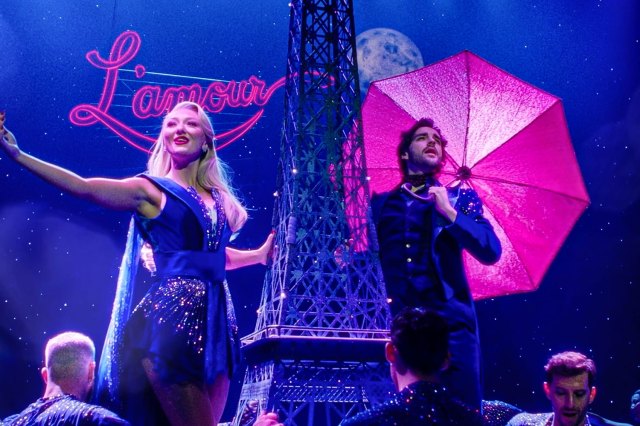The Duchess of Malfi at the Sam Wanamaker Playhouse at Shakespeare’s Globe – review
Rachel Bagshaw’s production of the John Webster classic runs until 14 April

In 2014, Shakespeare’s Globe’s then-artistic director Dominic Dromgoole helmed a production of John Webster’s tragedy The Duchess of Malfi to christen the venue’s new indoor Sam Wanamaker Playhouse. The production starred Gemma Arterton in the title role. Things now come full circle with Rachel Bagshaw’s new staging of the play, which marks part of the candlelit pseudo-Jacobean auditorium’s tenth-anniversary celebrations.
Opening with a masked pageant of hedonism, Bagshaw’s version is based in a stylised contemporary setting featuring colourful satin lounge suits and cocktail dresses. The action is accompanied by a brassy avant-garde jazz score by Anna Clock.
As the heroine, who’s introduced as a sun goddess of sorts in gold feathers and sequins, Francesca Mills, who has Achondroplasia, a form of dwarfism, radiates authority and independent-mindedness. The widowed Duchess is a remarkably assertive female protagonist who knows what she wants and sets out to get it. Aware of her charms, she hoicks up her cleavage before crossing herself in order to propose to her steward, Antonio. The younger sister to two brothers who try to control her, she is far more intelligent than either of them.
Olivier Huband’s Antonio, who has returned from France wearing a Breton top and with tales of a more egalitarian and less sycophantic court, is a ‘nice guy’ but doesn’t have a great deal of chemistry with Mills. As the brothers, Oliver Johnstone is a slippery Ferdinand and Jamie Ballard a dry Cardinal. Arthur Hughes’ thuggish servant Bosola is really no more of a villain than the high-born brothers, who has ‘hazarded his limbs’ in battle (Hughes has radial dysplasia affecting the use of his right arm).
Bagshaw’s production is more successful when tapping into the dark farcical aspects of the play rather than the tragedy, particularly when the Duchess is about to give birth to another secret baby. Some of Webster’s plotting is questionable. It’s just about feasible that the Duchess could successfully conceal three pregnancies, though how the children are successfully kept hidden with so many spies around is another question. It’s also an odd play structurally, as the protagonist dies movingly and with outstanding dignity about 30 minutes before the end and there are a number of other characters to despatch afterwards (Shazia Nicholls is a strong and loyal presence as waiting woman Cariola). It does somewhat lose momentum as the pile of dead bodies fill the stage one by one.
‘Love mixed with fear is the sweetest’ observes the Duchess, and she knows how to chase the light in an unforgiving society where marriage has nothing to do with love. In the Sam Wanamaker Playhouse, it always feels amazing how much light can come from just a few candles (kudos to candle consultant Sally Ferguson). It might be one of the most physically uncomfortable theatres in London with less-than-ideal sightlines, but it always makes for an experience and on its tenth birthday, here’s to many more atmospheric productions in the future.


![Globe [DoM] TodayTix 300x200](https://www.whatsonstage.com/wp-content/uploads/sites/3/2023/06/Globe_DoM_TodayTix_300x200.jpg?w=300)
















